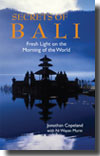| Our Publications | ||
| Books by Title | ||
| Books by Author | ||
| Books by Country | ||
| E-books | ||
| About | ||
| Orchid Press E-books | ||
| Distributed E-books | ||
| Our Bookshop | ||
| About Us | ||
| Browse Shop | ||
| How to Buy | ||
| Contact Us | ||
| WE BUY BOOKS AND LIBRARIES | ||
|
||
Book Reviews

Secrets of Bali:
New Light on the Morning of the World
by Jonathan Copeland with Ni Wayan Murni
2010, 312 pp., 110 line drawings, 1 map, glossary, bibliography, index, 21.5 x 14 cm., softcover.
ISBN-13: 978-974-524-118-3 $30.00
(E-book edition $11.99)
Book review by Ni Luh Dian Purniawati
(Bali & Beyond January 2011)
When I reminisce back to my childhood days, I remember how the Balinese people were so proud of their ‘Bali-ness’. There was one joke they frequently brought up. It goes that when a Balinese asks a tourist, “what do you think of Indonesia”, tourists back in the day would often look confused and say that they had no idea, “Indonesia? Which side of Bali is Indonesia?” No offence to their depth of geography, though. The joke is still relevant up to this day. There are still some who know Bali, the island, far better than Indonesia, the nation.
Small wonder that Jonathan Copeland in a chapter in his book wrote, “Bali is a small island with a big reputation.” This small island has indeed become an inspiration to many of its visitors. Many foreigners have come, fallen in love with, and then stayed on in Bali. There are also those who came and left but still keep Bali in memory, be it in the form of paintings or books.
One of the latest to have put Bali down in writing is Copeland through his book, The Secrets of Bali. Copeland was born and went to school in Belfast, Northern Ireland before going to London to study law at University Collage London. He practiced law in two major law firms in the city of London for 25 years. Throughout that time he traveled to Southeast Asia. He came to Bali with a travel survival kit in hand and knew nothing about the island.
Soon he found out that there were so many things that he did not comprehend about Bali. Indeed, Bali has many things that seem to not fit into mainstream logic and cannot be easily comprehensible to the western way of thought. The latter, being identical to individualistic living patterns and logical thinking, while the Balinese live a communal life with their banjar community groups being the smallest social group and at the same time the strongest.
The Balinese are also very inseparable from their rituals and have strong beliefs in dynamism. Many things remain incomprehensible. This reminds me of the big question from a German friend. Back then she saw me preparing offerings for rituals. There were many fruits, flowers, and young coconut leaves used. Also a great deal of time used in arranging them. She asked, “What are these offerings for? It looks like a frittering away of time and resources.” It is not surprising that she asked, because it was not the first time, but many time she had seen such a procession.
This question would never be asked by a Balinese due to their perspective differences. Offerings or banten in the local tongue is derived from the word ‘enten’ meaning awakened or conscious. Offering banten can be defined as a form of self awakening that humans are subjects of a universal energy. All that exists and humans possess come from God. Ceremonies are not processions that are meant to waste money. Besides attaining meanings, what’s left of the rituals can be taken back and enjoyed by the offering’s arranger.
Copeland perhaps had the same question. But luckily he met up with Wayan Murni, a lady from Ubud who had and ran a warung there. Murni is a Balinese woman with a keen insight on tourism. She realized that Bali has many unique aspects that invoke foreigner’s curiosity. It seems that the realization of the many hidden secrets Bali keeps pushes them to dig up explanations and record them in books. This 412-page book tries to summarize every aspect of Bali. Starting from the creation of the universe from a Hindu approach (the major religion in Bali), Balinese architecture, rituals, and the arts and up to the paradigm shift among the modern Balinese. All are explained in the 60 chapters. This book is very interesting in particular for those who want to know about Bali and are eager for answers to general questions. However for more specific and profound questions, a book with a more complete assessment is yet to be published. And in several volumes, perhaps.
[Read a review from the Bali Advertiser] [Read a review from ASEASUK News] [Read a review from Tropical Life Magazine] [Read a review from Hello Bali Magazine ] [Read a review from The South China Morning Post] [Read another review from The Bali Advertiser] [Read a review from The Jakarta Post] [Read a review from The Bali Times] [Read about the remarkable life of co-author Murni] [More Orchid Press Reviews]
PO Box 70, Trinity TB, NL, A0C 2S0, Canada
Telephone: +1 709-330-4703